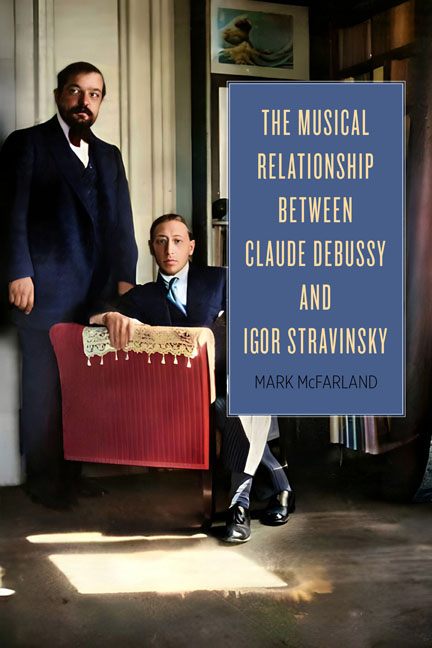Book contents
- Frontmatter
- Dedication
- Contents
- Acknowledgments
- Introduction
- 1 A Mutual Influence
- 2 Cinematic Montage and Stratified Form
- 3 Stratified Form in Debussy’s Works: 1909–1913
- 4 Debussy and the Chromatic Set
- 5 Stratified Form in Jeux
- 6 Stravinsky’s Waning Influence: 1914–1917
- Conclusion
- Glossary
- Bibliography
- Index
6 - Stravinsky’s Waning Influence: 1914–1917
Published online by Cambridge University Press: 10 May 2024
- Frontmatter
- Dedication
- Contents
- Acknowledgments
- Introduction
- 1 A Mutual Influence
- 2 Cinematic Montage and Stratified Form
- 3 Stratified Form in Debussy’s Works: 1909–1913
- 4 Debussy and the Chromatic Set
- 5 Stratified Form in Jeux
- 6 Stravinsky’s Waning Influence: 1914–1917
- Conclusion
- Glossary
- Bibliography
- Index
Summary
This study, as mentioned in chapter 1, has used the traditional method of identifying influence, the twin concepts of access and similarity. This method is related to the “influence as generosity” theory, one that in literary criticism descends most clearly from T. S. Eliot. This is not the only theory to use for the study of influence; I chose to rely on it because the “anxiety of influence” theory, one originated by Harold Bloom and applied to music most notably by Joseph Straus, can sometimes lead to misleading results. There is, however, one element of this latter theory that is especially appropriate for the investigation into Stravinsky's influence on Debussy: the element of competition and Debussy's reaction to it.
Debussy was enthusiastic about The Rite between his sight-reading of the score in June 1912 and its premiere a year later. His opinion of the work changed, however, for he described the ballet on the day of its first performance as “primitive music with all modern conveniences.” His criticism quickly became more cutting, for on the day after the premiere he remarked, “C’est tout de même pas comme ça qu’on fera de la musique française.” Finally, after the outbreak of war in 1914, Debussy told Ernest Ansermet:
You know how much I admire Petrushka, but The Rite disturbs me. It seems to me that Stravinsky is trying to make music with non-musical means, just as the Germans apparently pretend to be able to make beef steaks out of sawdust. Negro drumming is not really music after all.
Debussy's attitude toward The Rite was no doubt affected by the contrast between the riotous premiere of Stravinsky's ballet and the cool reception given to Jeux just two weeks previously. Stravinsky seems to confirm as much when he writes that “Debussy, who might well have been upset by The Rite was, in fact, much more upset by the success of it a year later.” Whatever the reason, the result was that Debussy's competitive spirit seems to have been broken. Faced with a score as revolutionary as The Rite, which Stravinsky said owed more to Debussy than to anyone else but which obviously carried his ideas to new extremes, Debussy must have realized that he had been eclipsed as the leading music figure in Paris. This change in status is reflected in the letter with which Debussy thanked Stravinsky for the score to this ballet.
- Type
- Chapter
- Information
- Publisher: Boydell & BrewerPrint publication year: 2024



